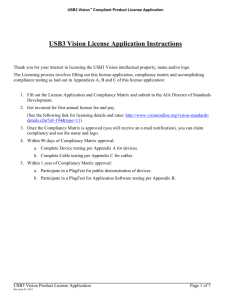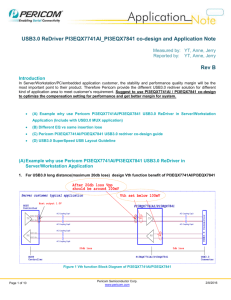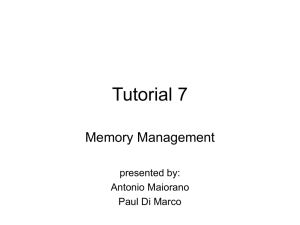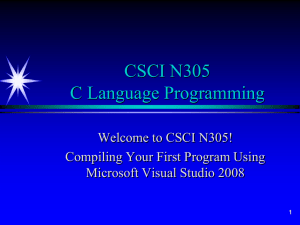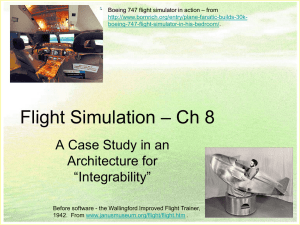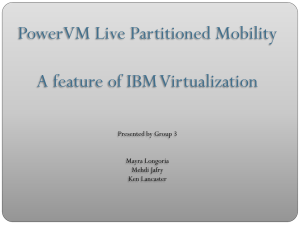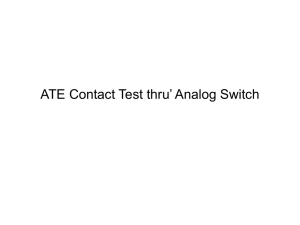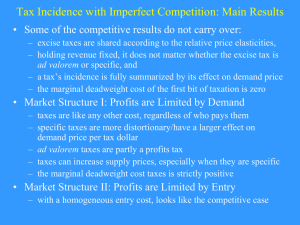Partition Compile Flow
advertisement
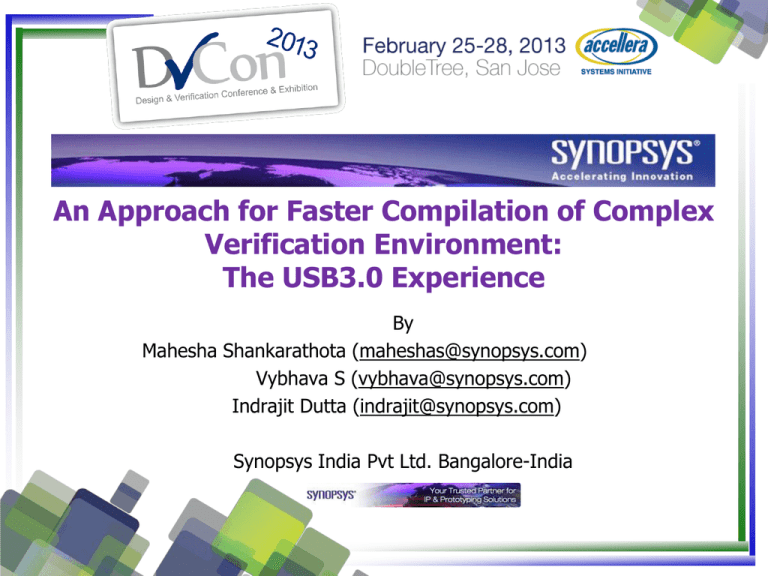
An Approach for Faster Compilation of Complex
Verification Environment:
The USB3.0 Experience
By
Mahesha Shankarathota (maheshas@synopsys.com)
Vybhava S (vybhava@synopsys.com)
Indrajit Dutta (indrajit@synopsys.com)
Synopsys India Pvt Ltd. Bangalore-India
Sponsored By:
Overview
6X compilation time gain using VCS® (2011.12) Partition Compile
Methodology
Example of a complex USB3.0 Configurable VMM Verification
Environment
Motivation and Methodology
Coding guidelines and good practices
Summary of Results and Conclusions
2 of 13
program p;
virtual SBus VirDutBus = tb.DutBus;
import TransactorPkg::*;
SBusTransctor xactor = new(VirDutBus);
package TransactorPkg;
initial begin
Sponsored By:
SV CONCEPTS
module tb;
class SBusTransctor;
virtual SBus bus;
fork
begin
xactor.request();
xactor.wait_for_bus();
end
function new( virtual SBus s);
bus = s;
endfunction
task request();
bus.req <= 1;
endtask
task wait_for_bus();
@(posedge bus.grant);
endtask
interface SBus;
logic
req,grant;
logic [7:0] addr,data;
endinterface
module dut(SBus
DutBus);
initial begin
wait(DutBus.req == 1);
dutBus.grant =1;
dutBus.addr =0;
dutBus.data = 15;
end
endmodule
Sbus DutBus();
dut DUT(DutBus);
endclass
endpackage
begin
wait(tb.DUT.DutBus.req == 1); //XMR
endmodule
//wait(VirDutBus.req == 1);
wait(tb.DUT.DutBus.grant == 1);
//wait(VirDutBus.grant == 1); // XMR replaced by Virtual Interface
end
// Code in $unit scope
join
covergroup cov;
option.per_instance =1;
$unit::cov1.sample();
cp1: coverpoint tb.DutBus.req ;
end
cp2: coverpoint tb.DutBus.grant;
cp3: coverpoint tb.DutBus.addr;
endprogram
cp4: coverpoint tb.DutBus.data;
3 of 13
endgroup
cov cov1 = new();
$unit is the name of the scope that encompasses a
compilation unit. Compilation unit refers to module,
interface, package, and program blocks.
USB 3.0
verification
environment
$unit scope
This
environment
uses VCS
single
compile flow
for
simulation.
USB3 VIP classes
INTF
PROGRAM
USB3 DUT
<test
section>
USB3 PHY
Interfaces
Cross Partition Reference
Typedef of class
where definition of
class is not defined
in same scope
4 of 13
Verilog Subsystem
AHB, AXI Classes
USB3 test env classes
Sponsored By:
XMR
Direct
accessing of
DUT signals
inside the
program block
Adopting Partition compile Flow
Sponsored By:
Partitions need to be made as packages/modules/programs.
Avoid code in $unit (code-changes in $unit scope trigger
recompilation of the entire design).
Identify the Partitions - USB3 TE partitioned well into AHB/AXI,
USB3 VIP, DUT+PHY, COM, TST partitions.
SV code modifications to remove XMRs(Cross module references)
and Cross Partition References.
The biggest challenge for us was converting all the XMRs to
interface signals.
Update of makefiles and scripts.
5 of 13
SystemVerilog packages provide an additional mechanism for
sharing parameters, data, type, task, function, sequence and
property declarations. Packages can be imported or referenced in
the SystemVerilog module, interface, and program blocks.
USB 3.0
verification
environment
This
environment
uses VCS
partition
compile flow
for
simulation.
Verilog Subsystem
`include interfaces.sv
AHB, AXI Package
USB3 test env Package
USB3 VIP Package
Sponsored By:
INTF1
PROGRAM {
import AHB/AXI::*
import USB3VIP::*
import USB3TE::*
<test section>
Interfaces
USB3 DUT
INTF2
USB3 PHY
}
typedefs are removed by
importing the packages in order
XMRs are replaced by
Virtual Interfaces
A virtual interface allows the same subprogram to operate on different
portions of a design and to dynamically control the set of signals associated
with the subprogram. Instead of referring to the actual set of signals directly,
users are able to manipulate a set of virtual signals.
6 of 13
PARTITION COMPILE FLOW STEPS
vlogan AHB_AXI_VIP_PKG INTF
Sponsored By:
Analysis of different partitions
vlogan USB3_VIP_PKG
Analysis of the configuration file
vlogan USB3_RTL
elaboration which generates simv
(executable to run the simulation)
vlogan USB3_TE_COM_PKG
vlogan PROG_BLK
vlogan topcfg
vcs topcfg -partcomp
Change in program block
Change in common file
of program block
Change in DUT/RTL only
Change in USB3 VIP pkg
Change in AHB or AXI pkg
For compilation from scratch, run all steps
7 of 13
config topcfg;
design tb work_dir.prog;
partition package AHB_AXI_VIP_PKG;
partition package USB3_VIP_PKG;
partition package USB3_TE_COM_PKG;
partition cell USB3_RTL;
partition cell PROG_BLK;
default liblist DEFAULT work_dir;
endconfig
Partition Compile Coding Guidelines
Sponsored By:
Avoid code in $unit scope – It triggers re-compilation
No forward references to different compilation-unit scope
No direct access of DUT signals in program scope
All DUT signal accesses should be through virtual interface
No force, release constructs of the signals
8 of 13
No direct access of signals from TE
All signal accesses should be done through interface signals.
Single Compile
Partition Compile
DWC_usb3_if.sv
interface DWC_usb3_tb_signals_if ();
logic [7:0] ulpi_tx_data;
endinterface //DWC_usb3_tb_signals_if
ec_hst.sv
gbl.tb_signals_if=
`TB_INST_NAME.tb_signals_if;
gbl.clk_rst_if = `TB_INST_NAME.clk_rst_if;
gbl.misc_if = `TB_INST_NAME.misc_if;
9 of 13
tp1926.sv
tp1926.sv
begin
wait (
tb.U_DWC_usb3_subsys.ulpi_tx_data[7:0] ==
8'h00);
end
begin
wait ( gbl.tb_signals_if.ulpi_tx_data[7:0] ==
8'h00);
end
Sponsored By:
Cross Partition Reference
Single Compile Flow
Sponsored By:
Partition Compile Flow
typedef bit[3:0] TYPE;
$unit scope
typedef class operator_class;
package p1;
typedef bit[3:0] TYPE;
class update_vecs_class;
TYPE n1;
TYPE n2[4:0];
TYPE n3[3:0][3:0];
TYPE n4;
operator_class op;
task put(TYPE in[3:0]);
op = new;
n1 = in[0];
n2[3:0] = in;
n3 = '{4{in[3:0]}} ;
n4 = op.invert(n1);
endtask;
function TYPE get(int j);
return n2[j];
endfunction
class operator_class;
TYPE x1;
class operator_class;
TYPE x1;
function TYPE invert(TYPE in);
x1 = ~in;
invert = x1;
endfunction
endclass
class update_vecs_class ;
function TYPE invert(TYPE in);
x1 = ~in;
invert = x1;
endfunction
endclass
endpackage
endclass
10 of 13
import p1::*;
// Common Program in both flows
program p;
update_vecs_class T1 = new;
initial begin
TYPE in[3:0],in0,in1, in2, in3;
in[0] = 10;
T1.put(in);
in0 = T1.get(2);
$display( "in data = %d get data = %d shift_data =
%d\n", in[0], in0, T1.n4);
end
endprogram
TYPE n1;
TYPE n2[4:0];
TYPE n3[3:0][3:0];
TYPE n4;
operator_class op;
task put(TYPE in[3:0]);
op = new;
n1 = in[0];
n2[3:0] = in;
n3 = '{4{in[3:0]}};
n4 = op.invert(n1);
endtask;
function TYPE get(int j);
return n2[j];
endfunction
endclass
Sponsored By:
Removal of XMRs – Example
The RAM “XX” initialization logic from the program scope is moved
to Verilog Subsystem
ad_xactor.sv
`ifdef DWC_USB3_DPRAM_PORT_EN
`PRINT_NORMAL($psprintf("%0s: Re-init
DPRAM0 with X ",prefix));
`ifdef DWC_USB3_RAM0_PORT1_EN
gbl.misc_if.dpram_initx[0] = 1'b1;
wait(gbl.misc_if.dpram_initx_done[0] == 1'b1);
gbl.misc_if.dpram_initx[0] = 1'b0;
`PRINT_NORMAL($psprintf("%0s: Done Re-init
of DPRAM0 with X ",prefix));
`endif
`endif
11 of 13
DWC_usb3_subsys.sv
`ifdef DWC_USB3_DPRAM_PORT_EN
`ifdef DWC_USB3_RAM0_PORT1_EN
always
begin
#1;
@(posedge misc_if.dpram_initx[0]);
for (int i = 0; i < U_RAM0_dpram.DEPTH; i= i+1)
begin
$display("DWC_usb3_xmrs:Done Re-init of
DPRAM0 i=%d",i);
U_RAM0_dpram.mem_array[i] =
{U_RAM0_dpram.DATA_WIDTH{1'bx}};
end
misc_if.dpram_initx_done[0] = 1'b1;
end
`endif
`endif
Sponsored By:
Summary of Results
Legacy
Compile
12
single compile
12.5
scratch compile
3.9
AHB_AXI_VIP_PKG
4.3
USB3_VIP_PKG
Partition
Compile
Options*
4.4
USB3_TE_COM_PKG
6X
1.7
PROG_BLK
1
RSIM
0
* Time taken for each partitions to be recompiled
12 of 13
2X
5.5
USB3_RTL
2
4
6
Compile time in minutes
8
10
12
14
Sponsored By:
Conclusions
The legacy single compile flow takes about 12 minutes
of compile time each time. The typical usage is change
in the test (PROG_BLK), which takes about 2 minutes to
be compiled. This provides a 6X gain compilation time.
When the simulation run-time options change (RSIM),
there is no compile to be done and we see maximum
improvement.
Adhering to good coding practices makes migration
easier.
Migration has overhead of maintaining both the flows in
sync until partition compile flow is stable.
13 of 13
